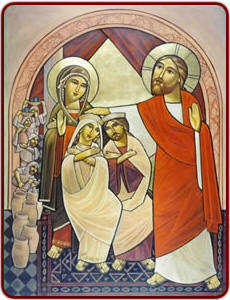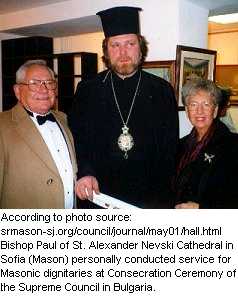The Prime Characteristic
“Nothing is so characteristically Christian as being a peacemaker.”– St Basil the Great, Letter 114
“Nothing is so characteristically Christian as being a peacemaker.”– St Basil the Great, Letter 114
“When our hearts are reluctant we often have to compel ourselves to pray for our enemies, to pour out prayer for those who are against us. Would that our hearts were filled with love! How frequently we offer a prayer for our enemies, but do it because we are commanded to, not out of love for them. We ask the gift of life for them even while we are afraid that our prayer may be heard. The judge of our soul considers our hearts rather than our words. Those who do not pray for their enemies out of love are not asking anything for their benefit.” – St. Gregory the Great, “Be Friends of God”
“We [the Christians] started yesterday and already we have filled the world and everything that belongs to you — the cities, apartment houses, fortresses, towns, market places, the camps themselves, your tribes, town councils, the imperial palace, the Senate, the Forum. The only thing we have left to you are the temples. We can count your armies; there is a greater number of Christians in one province! What kind of war would we, who willingly submit to the sword, not be ready or eager for despite our inferior numbers if it were not for the fact that according to our doctrine it is more permissible to be killed than to kill.” – Tertullian, Apology, 37:4
“The patrisitic tradition is neither a social philosphy nor an ethical system, nor is it religious dogmatism: it is a therapeutic treatment… The spiritual energy of the soul that prays unceasingly in the heart is a physiological instrument which everyone has and which requires healing. Neither philosophy nor any of the known positive or social sciences is capable of healing this instrument. That can only be done through the Fathers’ neptic and ascetic teaching. Therefore those who are not healed usually do not even know of the existence of this instrument.” – Fr. John Romanides
“We confess One God not in number, but in nature. For what is one in number is not really one, nor single in nature.” – St. Basil the Great
“The bodies of fellow human beings must be treated with greater care than our own. Christian love teaches us to give our brethren not only spiritual gifts, but material gifts as well. Even our last shirt, our last piece of bread must be given to them. Personal almsgiving and the most wide-ranging social work are equally justifiable and necessary. The way to God lies through love of other people and there is no other way. At the Last Judgment I shall not be asked if I was successful in my ascetic exercises or how many prostrations I made in the course of my prayers. I shall be asked, did I feed the hungry, clothe the naked, visit the sick and the prisoners: that is all I shall be asked.” – Saint Maria Skobtsova of Paris [source]
“Do you wish to honor the Body of the Savior? Do not despise it when it is naked. Do not honor it in church with silk vestments while outside it is naked and numb with cold. He who said, “This is my body,” and made it so by his word, is the same that said, “You saw me hungry and you gave me no food. As you did it not to the least of these, you did it not to me.” Honor him then by sharing your property with the poor. For what God needs is not golden chalices but golden souls.”
–St. John Chrysostom / “On the Gospel of St. Matthew”, 50, iii (PG 58, 508) [source]
“Then shall the King say unto them on his right hand, Come, ye blessed of my Father, inherit the kingdom prepared for you from the foundation of the world: For I was an hungred, and ye gave me meat: I was thirsty, and ye gave me drink: I was a stranger, and ye took me in: Naked, and ye clothed me: I was sick, and ye visited me: I was in prison, and ye came unto me.” – Christ, The Olivet Discourse (Another Sermon on the Mount)
Comment: Who is the hungry? It is all those who want for anything, tangible or intangible. Christ is the hungry, who persevered in fasts for 40 days. Who is the thirsty? It is all those whose bodies are deprived of water, impeding their salvation, and who are deprived of the Spirit, keeping them in slavery, and who are deprived of baptism, keeping them in darkness concerning the Holy Trinity. Christ is the thirsty, who was given bitter gall. Who is the stranger? The stranger is the immigrant, the alien, the foreigner, the ethnic, the non-ethnic, the newcomer, the illegal alien, the person of another culture, even a hostile culture, the deviant, the dissident, the outsider, the antisocial, and the person whom we feel we will never understand. Enemies are strangers. These are days in which it is frequently forgotten that the stranger is Christ, who comes to us as a stranger. He comes to those who are really his own, and we do not know him, even denying him in the world when the cock crows. Who is the naked? The naked are all vulnerable people in the world, and the vulnerable among us. The naked is Christ, for whose clothes we drew lots. Who are the sick? The sick are all of us, because we are all sick with the affliction of Death, the source of all sickness. Christ became sickness for us, became sin, taking our infirmity that we might be healed. Who is the prisoner? The prisoner is the person kept in physical bondage, kidnapped, traded as a slave, captured as enemies and imprisoned for interrogation, tortured, jailed for crimes – the prisoner is the guilty as well as the innocent. The prisoner is all those kept in emotional or physical bondage by the wielders of power, control, and wealth. The prisoner is the one deprived of the means of freedom. The prisoner is the one who lifts up his eyes in Hell or Hellish existence. The prisoner is every one of us who in any way yields to the passions; we are the wrongly imprisoned, on a self-imposed sentence, and we too are in need of mercy. The prisoner is Christ, taken in chains to Golgotha, tortured, mistreated, unjustly convicted, and sentenced to death at the hands of civil and religious authorities. All these, the hungry, thirsty, stranger, naked, sick, prisoner, and us, and Christ, are “the poor”. But “blessed are the poor in spirit,” those who “consider themselves inferior to all.” As the fathers say, “there is only one sin, that of despising anyone.” or as Christ put it, “Inasmuch as ye have done it unto one of the least of these my brethren, ye have done it unto me.” Christ’s sermon then shows us the Passion, and also the gifts of the Spirit, telling the whole gospel. And it is actually a full explication of the answer to that pressing question: ‘How should we then live?’ – DD
 I once told a friend that I was setting out on a journey to learn to love my wife. I believed that if I learned to love my wife, I would learn to love others. And if I can’t learn to love my wife, I told him, then I fear I will never learn to love anyone. My friend periodically, after long periods of time, writes to ask me if I’ve learned to love my wife. And I have always written back, “Not yet. I think it will take a long time.” Recently, I wrote to him to say:
I once told a friend that I was setting out on a journey to learn to love my wife. I believed that if I learned to love my wife, I would learn to love others. And if I can’t learn to love my wife, I told him, then I fear I will never learn to love anyone. My friend periodically, after long periods of time, writes to ask me if I’ve learned to love my wife. And I have always written back, “Not yet. I think it will take a long time.” Recently, I wrote to him to say:
“I haven’t learned to love my wife, but I’ve learned a different thing. I have learned to always be moving into love with my wife. But this is doing the thing I wanted. It it teaching me to love others.”
I have been listening to the Fathers telling me that pride is a denial of God, one of the forms of atheism, and that there is only one sin: that of despising anyone. I am listening. I am beginning to learn the beginning. To begin as often as necessary, as a rule, but to strive also for the end.
There is a gentle, unceasingly light. Love abroad. Love on the move. Love walking about in the world. Love looking for the beloved, calling the lover, and making, in the local sense, where anyone will, the unity of all men. I am experiencing it in my friendships; I am learning to love my enemies. I am learning to love those who have left scars.
Listening. I am listening, to be learning to ever be moving into love with my wife. Keep my feet, Father. Make of my heart a fire, a welcome door. Make my heart into alms, and save me.
 In the field of sociology, much really excellent work has been done on analyzing the polity of cult behavior. The analysis has proceeded quite helpfully across confessional boundaries, to think in terms of cult social behavior, cult attitudes (in terms of social psychology), cult social structures, etc. There have been many studies and many lists of earmarks of cults put out, and some points are controversial, while others have nearly universal agreement. “Nearly”, because of course some groups feel justifiably threatened by the analysis. The analysis can apply to an entire group, to a group within a group, to a mere congregation of something vast and universal, or to an entire confession. The sociological elements are key, not anything like “official” status, sanction, or membership. Your tax-exempt status has no relevance. Likewise it does not assume that all cult or cult-like groups will have all of the elements, so analysis is not intended to be comprehensive, but rather to look for a constellation of attitudes and behaviors that elicit a trend. Here are set of common elements culled from some of this analysis: …
In the field of sociology, much really excellent work has been done on analyzing the polity of cult behavior. The analysis has proceeded quite helpfully across confessional boundaries, to think in terms of cult social behavior, cult attitudes (in terms of social psychology), cult social structures, etc. There have been many studies and many lists of earmarks of cults put out, and some points are controversial, while others have nearly universal agreement. “Nearly”, because of course some groups feel justifiably threatened by the analysis. The analysis can apply to an entire group, to a group within a group, to a mere congregation of something vast and universal, or to an entire confession. The sociological elements are key, not anything like “official” status, sanction, or membership. Your tax-exempt status has no relevance. Likewise it does not assume that all cult or cult-like groups will have all of the elements, so analysis is not intended to be comprehensive, but rather to look for a constellation of attitudes and behaviors that elicit a trend. Here are set of common elements culled from some of this analysis: …
St. Clement of Alexandria: “The Word of God became man, that you may learn from man how man may become God.”
St. Athanasius of Alexandria: “For he was made man that we might be made God…and…he himself has made us sons of the Father, and deified men by becoming himself man.”
St. Gregory the Theologian: “Let us become as Christ is, since Christ became as we are; let us become gods for his sake, since he became man for our sake.”
St. Gregory of Nyssa: “…the Word became incarnate so that by becoming as we are, he might make us as he is.”
St. John Chrysostom: “He became Son of man, who was God’s own Son, in order that he might make the sons of men to be children of God.”
St. Ephrem the Syrian: “He gave us divinity, we gave him humanity.”
St. Hilary of Poitiers: “For when God was born to be man, the purpose was not that the Godhead should be lost but that, the Godhead remaining, man should be born to be god.”
St. Augustine of Hippo: “God wanted to be the Son of Man and he wanted men to be the Sons of God.”
Pope St. Leo the Great: “[The Savior] was made the son of man, so that we could be the sons of God…and…He united humanity to himself in such a way that he remained God, unchangeable. He imparted divinity to human beings in such a way that he did not destroy, but enriched them, by glorification.”
…
Wherefore clad in the sacred vestments of epitrachilion and omophorion, we say, If any man preach unto you any other gospel than that which we have preached unto you, even though an angel from heaven, let him be anathema (Galatians I8:9). As many as are befitting, that pursue after such a diabolical and lawless employment of Freemasonry, and all they that follow unto their infatuation and unto their error, let them be excommuicated and accursed by the Father, the Son, and the Holy Spirit. After death, they shall be unpardoned, indissoluble, and bloated. Groaning and trembling, as Cain, shall they be upon the earth (Genesis 4:14). The earth shall cleave and swallow them up, as Dathan and Abiram (Numbers 16:31-32). The wrath of God shall be upon their heads, and their portion together with Judas the betrayer. An angel of the Lord will prosecute them with a flaming sword and, unto their life’s termination, they will not know of progress. Let their works and toil be unblessed and let them become a cloud of dust, as of a summer threshing-floor. And all they indeed that shall abide still unto their wickedness will have such a recompense. But as many as shall go out from the midst of them and shall be separated, and having spat out their abominable heresy, and shall go afar off from their accursed infatuation, such kind shall receive the wagers of the zealot Phineas; rather let them be blesed and forgiven by the Father, and the Son, and the Holy Spirit, the Only unconfused and undivided Trinity, the One God in nature, and by us His servants.” – The Aphorism Against Freemasonry – St. Cyprian, Archbishop of Cyprus, Martyred in defense against the Turks 1821.
 It occasionally bears repeating, that Orthodox are forbidden to be freemasons. Period. No, ifs, ands, buts. Not if we understand it in a certain way. Not if it is this or isn’t that. It’s verboten. Among the various acts condemning participation in masonry are:
It occasionally bears repeating, that Orthodox are forbidden to be freemasons. Period. No, ifs, ands, buts. Not if we understand it in a certain way. Not if it is this or isn’t that. It’s verboten. Among the various acts condemning participation in masonry are:
…
Hmmm. I still hold to Fr. Seraphim Rose’s argument, that evolution is rejected in principle, since death is a result of the human fall, and there was no death prior to that.
One can get into scriptural arguments, like the animals eating ‘every green herb’ rather than each other, but I think this is to descend to the ground of one’s opponents unnecessarily. The burden is on the one who would claim to simultaneously hold Orthodox doctrine and evolutionary theory.
I’ve read the arguments against that by orthodox claiming that, well, the garden wasn’t the whole earth, and so on. I think those are straw man arguments.
I could see an argument for Eden existing outside of normal time, so that the curse fell upon the garden and the rest of the world simultaneously but at different times, yielding an old earth subject to death and a young mankind entering the world at a particular time-point and subject to the same death. Leaving the garden would then constitute being subjected to a world embued with normal time and mortality at once. And I could see that, as well, fitting with scriptural assertions that death was created to ensure that man could not live forever in either his illicit knowledge or his sins. Still, in this scenario, death would begin with man’s fall. The origin and problem of death is an inviolable tenet of our Faith.